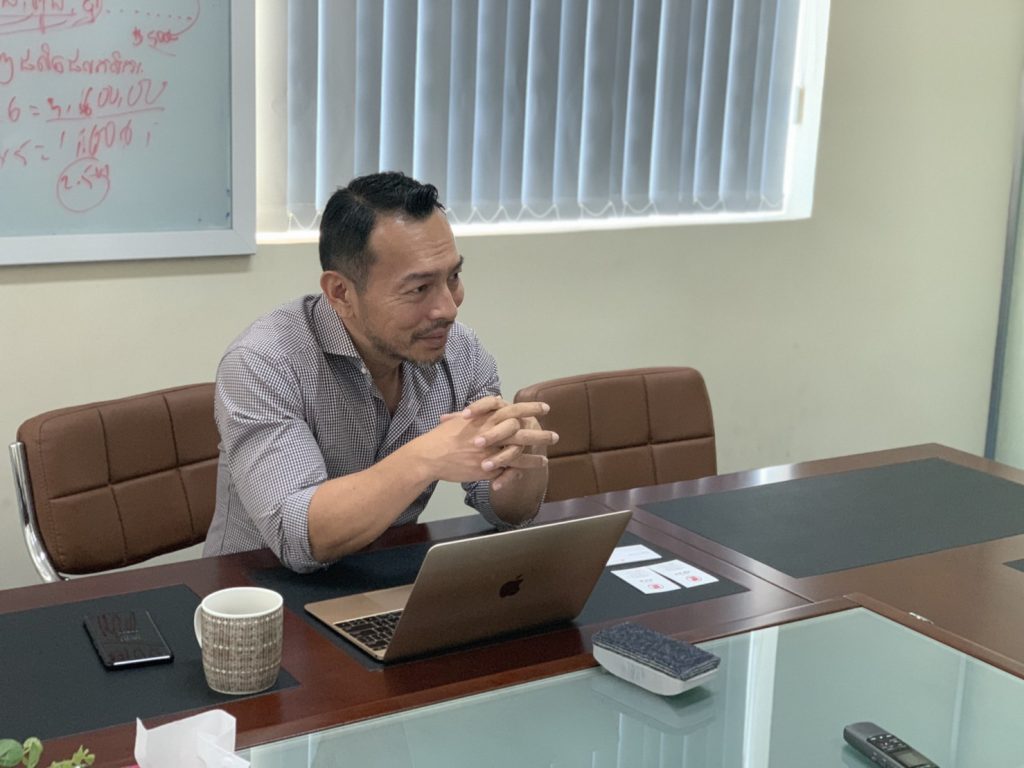AGRIBUDDY (web site) provides FinTech and Ag Tech services for farmers, mainly in Cambodia and India. The company has built a mechanism to use technology to collect and visualize data from farmers in developing countries while linking it with financial institutions. Because of this, the farmers have an environment in which they can easily obtain financing. The ultimate goal is to create a financial and insurance infrastructure to protect the lives of farmers in developing countries. We interviewed Mr. Kengo Kitaura (CEO), about the situation in Cambodia where AGRIBUDDY’s main focus is.

■A brief introduction of Kengo Kitaura
AGRIBUDDY Ltd. Chief Executive Officer. Born in Osaka in 1971 and currently lives in Cambodia. Upon graduating from junior high school, he moved to the US and studied at Western High School in Anaheim, California. After returning to Japan, he worked in consumer financing then he moved to Cambodia in 2010. AGRIBUDDY was established in January 2015.
※Bold letters:Interviewer Photo from:AGRIBUDDY

-Almost ten years have passed since you came to Cambodia, how has the agricultural situation changed?
First of all, the number of cattle farmers have decreased. The number of tractors has increased instead.. Cambodia is becoming like a “financial paradise”, tractors and other machineries are also being sold through financing.
I think the situation stated above in Cambodia has its positives and negatives, but it is very important for the farmers to have an environment in which they can obtain reliable financing. There are various services in the world categorized in Ag Tech, but even if there is good technology and great fertilizer or other Agri-products, none of them can be used without the money to buy it, and technology cannot be introduced without the appropriate knowledge. Personally, I think the biggest problem is not the lack of goods and services, but the lack of money and ability (knowledge) to introduce them.
Whether it’s a tractor or a new machine, if farmers have the money to invest there, they can take as many as they want. That’s where the ideology of AGRIBUDDY comes from. The geniuses around the world are creating great tools and technology. But I wonder, “How do they sell it?”, I think we have to change the fact that “the buyers are too poor to buy such things”.
-It seems like AGRIBUDDY is a combination of Ag tech and Fintech. What challenges do you face while developing services for farmers in developing countries? It feels like that is also the motivation for AGRIBUDDY to expand its business.
Without finance, you cannot buy real estate, homes or cars. Furthermore, even mobile phones. In Japan, everyone uses an iPhone, but since they pay the mobile phone cost on top of their call charges, it is also a type of loan. Without finance, things really don’t progress.
To take out a loan, naturally the financial institutions have to know if the loan will be repaid. For example, if you live in Japan and work for Mitsubishi Corporation, it is easy to lend money. If you are 30 years old and single, it is quite easy to predict the salary. Withholding slips and pay slips will show a more detailed financial situation, and Mitsubishi corporation will never issue a false pay slip. Also, by asking where they live gives you an idea of the rent they pay, if they had bought the house it is easy to calculate how much they pay on mortgage. So, the lender can assess the borrower’s ability to repay a loan without much effort.
However, If you are in Southeast Asia, payroll statements may be fake, and no tax proof will be issued in many cases. If they are working at a company, you can imagine that “someone’s salary working in Phnom Penh would be about $300 per month.” But if you a farmer, there is no way of getting such information. If you asked the farmers directly, they would say “I made $5000 last year” or “I made $10,000 last year”, but that can be sales and not profit, we can’t assess if those figures are for real either. Under such circumstances, the lender has no way to assess their ability to repay the loan.
I always emphasize, that the “credibility” that financial institutions think and that of what the farmers think are fundamentally different. The credibility that farmers and people in general think is something like, “I have never lied,” or “I have not betrayed anyone,” or “I have been living here all these years” and “I know everyone around here.”. On the other hand, the credibility that a financial institution has in mind is all about “What ability do you have to repay?” There is a big gap here. We thought that if we could fill the gaps in between the two, farmers would be able to borrow money. And if farmers are able to borrow money, they will be able to buy necessary Agri-input or machinery that they could have never afforded without financing, and the productivity of agriculture will increase.
There are many products to sell, many things the farmers want to buy, and there are many institutions to lend money. But the reality is that such institutions cannot lend money to the farmers. So, the farmers cannot buy the essentials they need to perform decent agriculture, the manufacturer can’t sell to farmers because they have no money either, we started our business so we could eliminate such situations in between.
